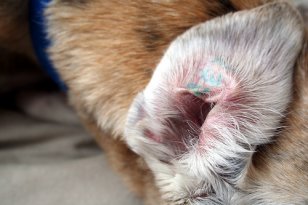Ear infections symptoms
"Dog ear problems"

Afraid your dog may be displaying ear infections symptoms? Here is some information to help you help your pet. Canine ear infections can be painful and even lead to deafness if not treated promptly. Make it a point to stay abreast on your dog’s regular daily activities and behaviors, that way you will quickly pick up on any changes or apparent discomfort.
Is your dog shaking its head or pawing at its ears? Does your dog shy away or attempt to nip when you handle its ears? Do you see your dog rubbing its head or ears on the ground, or furniture? These can be the first visible symptoms that your dog is having some type of ear trouble.

Testing for dog ear problems
Feel your dogs’ ears. Are they hot or moist to the touch? Is there swelling in the ear canal? This can indicate infection and pain. The swelling, left untreated, can lead to the necessity of surgery. This can also lead to permanent hearing damage.
If you are able to handle your dogs ears, gently put your thumb below the ear canal and cover the flap with the rest of your hand. Now gently rub then release. Did your dog immediately begin to scratch his ears? This could indicate ear mites rather than infection. However, ear mites can lead to an infection if not treated soon.

Dog ear wax buildup
Is there a waxy, odorous discharge present in the ear canal or on the ear flap? This can be yellow or black and smell yeasty or just foul. This discharge can seep into the middle ear and cause an infection to move into this and the inner ear. Then the infection moves into the inner ear and the ear infections symptoms continue to progress.
Hearing problems begin to occur with an inner ear infection. It may appear your dog is ignoring your commands or misbehaving, when in fact your dog may not be able to hear you. When not treated promptly, this damage can become permanent.
Some dog ear infections cause damage
There are instances where the ear infection can damage the nerves in the inner ear. This can result in your dog feeling dizzy. A dizzy dog will walk in circles, become disoriented, and tilt their heads. Nystagmus, or unusual eye movements are also associated with nerve damage in the inner ear.
There are many causes for canine ear infections and the treatments are fairly straight forward, making it easy to get your dog on the healthy track once again. A visit to your vet can determine if your dogs ear infections symptoms are what theyappear, and offer solutions to treat and prevent future ear infections.
Ear infections symptoms to Health



